‘Given the scale and the development trajectory of India’s manufacturing sector bearing potential similarities to that of the Chinese experience, Beijing realises the need to limit the rise of its geopolitical rival’
| Photo Credit: Getty Images/iStockphoto
In mid-January this year, news emerged of China preventing travel by its citizens working as engineers and technicians in Foxconn’s facilities in India. It was also reported that those already in India were being recalled, and that the restrictions extended to curbs on exports of critical specialised manufacturing equipment, over which China has a monopoly. While Foxconn has reportedly scrambled to bring in Taiwanese workers to fill the gap in manpower, it is the stoppage of specialised equipment that is crippling. Apple-Foxconn remains critical to India’s ambitions of becoming a global manufacturing power, and, therefore, such strangulation will affect that larger objective.
What is at play
These zero sum measures by China expand geopolitical competition with India through regulations on flow of capital and other factors of production. Fully cognisant of its dominance in advanced machinery and a well-trained workforce in tightly integrated global electronics production, China intends to also curb the tacit transfer of knowledge from Chinese technicians to their Indian counterparts on the assembly line. Combined with the disruptions on account of non-availability of specialised equipment, China has sought to weaponise its strategic location in the network of supply chains to slow down production in India, and place itself in an advantageous negotiating position.
The growing trade tensions between China and the West, specifically the United States, along with the COVID-19-related disruptions have led many global corporations to adopt a China Plus One diversification strategy to future-proof themselves. India has been in the forefront to seek benefits from this move along with countries such as Vietnam and Mexico.
Given the scale and the development trajectory of India’s manufacturing sector bearing potential similarities to that of the Chinese experience, Beijing realises the need to limit the rise of its geopolitical rival and also remind global corporations of its own indispensability to the production ecosystem.
Over the last few years, the Indian government, in coordination with its State governments, has pulled out all stops to entrench Apple-Foxconn’s investments in the southern part of the country. The efforts bore fruit in 2023, with the assembling of iPhone 15 models at Foxconn’s facility in Sunguvarchatram, Tamil Nadu along with another line in Tata Electronics’ plant in Hosur, Karnataka.
In the fiscal year ending March 2024, Apple assembled $14 billion worth of iPhones in India, through contract manufacturers Foxconn, Pegatron and Tata Electronics. In 2024, for the first time, iPhone 16 Pro models were assembled by Foxconn in India. State governments in south India have prioritised Apple-Foxconn in their pursuit of investments.

The conferment of the Padma Bhushan on Young Liu, Chairman of Foxconn, in 2024, further underscores the company’s importance for India. It appears that the emphasis has been on replicating Apple’s symbiotic relationship with China.
A pillar of ‘Make in India’
Large-scale electronics manufacturing, especially of smartphones, is one of the important pillars of the ‘Make in India’ programme. The Production-Linked Incentive (PLI) scheme, which was launched first in the electronics industry in 2020, has witnessed increased allocation by the central government — a sum of ₹8,885 crore ($1.02 billion) in the Union Budget this year, rising from ₹6,125 crore in the Union Budget 2024 ($0.70 billion).
A recent news report revealed that over three financial years, from 2022-23 to 2024-25, Apple’s contract manufacturers in India (Foxconn, Pegatron and Tata Electronics) had cumulatively received close to ₹6,600 crore ($0.76 billion), out of the total disbursed amount of ₹8,700 crore ($1 billion) under the PLI scheme. In addition, the Union Budget 2025 has completely removed basic custom duties/import taxes on mobile phone components such as printed circuit boards, camera modules, connectors, and sensors, as also different capital goods/machinery for use in the manufacture of lithium-ion batteries for mobile phones. It is notable that China’s zero-sum action happened just a few months after the thaw in India-China ties, post the patrolling agreement in October 2024 to end a four year-long military standoff between the two armies in eastern Ladakh.
Economic necessity — visible in the Indian dependence on China for components and machinery — is believed to have hastened the negotiations process. This illustrates how India-China relations do not (necessarily) hinge on a stable boundary, as geopolitical competition between both sides is only bound to get more acute in the future.
India needs to think long term
There are no easy solutions for India in the short term, and so, it needs to involve both Apple and Foxconn to negotiate with China for easing Beijing’s latest measures. Given that these corporations have stakes in both countries, their involvement could possibly help India’s case. However, this should also serve as another opportunity to hasten the process of future-proofing in terms of human resources, components and specialised machinery.
It needs to be kept in mind that India is still, largely, a centre of final assembly of smartphones. For a well-rounded and holistic manufacturing ecosystem that includes production of various components, ancillary industries need to be incentivised and scaled up.
The National Manufacturing Mission for small, medium and large industries, announced in the Union Budget is a good step, but it needs credible financial muscle that leads to development of clusters for technological knowledge-sharing. On-site training for workers, which includes tacit sharing of knowledge on the assembly line, needs to be complemented and augmented with industry-specific specialisation in skill development programmes.
More private capital needs to be encouraged in order to create a robust network of indigenous contract manufacturers for not just foreign corporations but also for domestic Indian brands.
Anand P. Krishnan is a Fellow at the Centre of Excellence for Himalayan Studies, Shiv Nadar Institution of Eminence, Delhi NCR
Published – February 15, 2025 12:08 am IST

